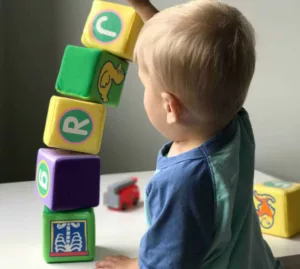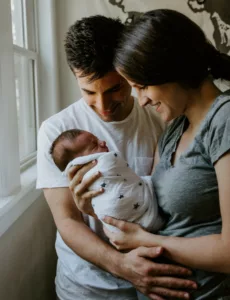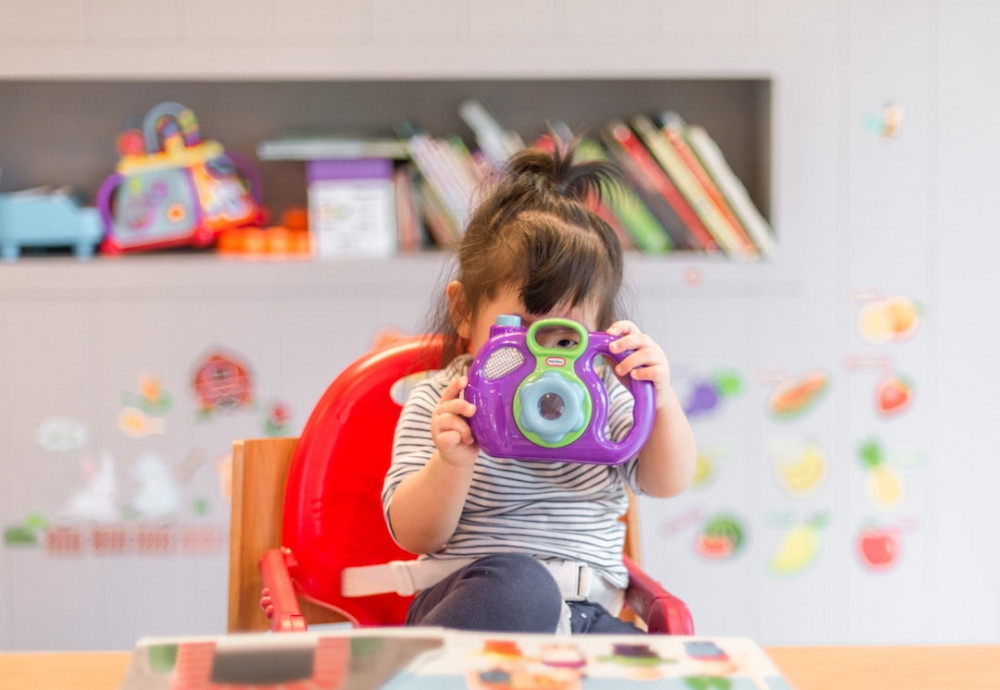
Your baby at 11 months old would be more as an explorer.
He/she would move swiftly around the room, using the furnitures as his support, and stand alone momentarily, or may be
able to standalone well. He would slowly and gently lower himself to the ground, and there could be chances that some
may walk well at this age. As an explorer, he/she would be very curious of his surroundings, would try to pull lids off boxes
to find whatever is inside them. He would be fascinated by containers and shakes them in the air. May be able to build a
small tower of blocks. He would enjoy turning the pages of the book as you read with him. He is able to play patty cake,
clap hands and wave bye-bye confidently. There is a good coordination of thumb and index finger and is able to pick up a
raisin.
Language
His attention is always on you 100%. He listens to you very carefully when you talk to him. Will be able to point object in a
picture book when you say its name. Follows simple instructions, like give something to you, but takes it back as fast.
Enjoys playing with musical toys, and goes with the rhythm of what he is playing either with body movements or his own
sounds. Is able to associate words with picture, like when you say “dog’ and he would point to the picture of a dog.
Learning
Follows your every move around the house, and mirrors more of your actions. It’s an honest reflection of how you manifest
yourself to other people around you. Your baby has come a long way ~ from a newborn, whose only way of communicating
was crying, to a six -month old who was beginning to comprehend words,,express anger and frustration, articulate sounds,
though an eight-month old who was able to convey messages through sounds and gestures, and now to an eleven- month
old who has spoken his/her real words. And yet with all the accomplishments already behind your precious little one, still
more astounding growth is to look forward to. Your baby’s comprehension will increase at a remarkable rate in the months to
come. By around a year, and a half, there would be a dramatic expansion in expressive language.
Here is how to help your baby in the language development :
Everything in your baby’s world has a name – LABEL IT
Literally, place a label on all objects surrounding your baby’s environment : lamp, toilet, sink, bathtub, stove, chair, crib,
playpen, TV, etc. Play and sing the “Head, shoulder, knees, and toes”, showing body parts as you sing it. Similarly, do it
with the all living and non-living things around him too, dogs, cat, birds, trees, flowers, planes, cars, trucks, etc.
Listen to the baby babble and respond
As important as what you say to your baby is how much you let your baby say to. You. Even if your baby has not clearly
said a clear word yet, listen to your baby babble, and respond. You have been communicating with your baby in a primitive
sounds and gestures for the longest time. When you ask a question, wait for an answer. Make a concerted effort to pick out
words from your baby’s verbal ramblings, even if it’s just a smile, excited body language, or undecipherable babble. Many
words are so garbled that parents don’t notice them. When you have trouble translating what your baby’s asking for, point
to any possibilities ~ a bottle?, a toy?, giving him a chance to tell whether you’ve guessed it right.
There will be frustrations on both sides until baby’s requests are more intelligible, but continuing to attempt to act as
interpreter will help speed language development and provide your baby with the satisfaction of being at least
somewhat understood.
Help your baby develop concepts
There are concepts that we take for granted, that your baby needs to learn and develop, such as :
Hot and Cold: let the baby touch cold water, then warm water; and ice cube, the outside of your coffee cup, cold glass
Wet and dry: let the baby touch a wet wash cloth, then a dry towel
Big and little: set a large ball beside a small ball
In and out: place a toy in a bucket and dump it out
Up and down: gently lift the baby up in the air, then lower to the ground; place a toy up in the dresser, then put it down
. on the floor
Full and Empty: fill a pail with water, then empty it
Stands and sit: hold the baby’s hand and stand together, then sit down together
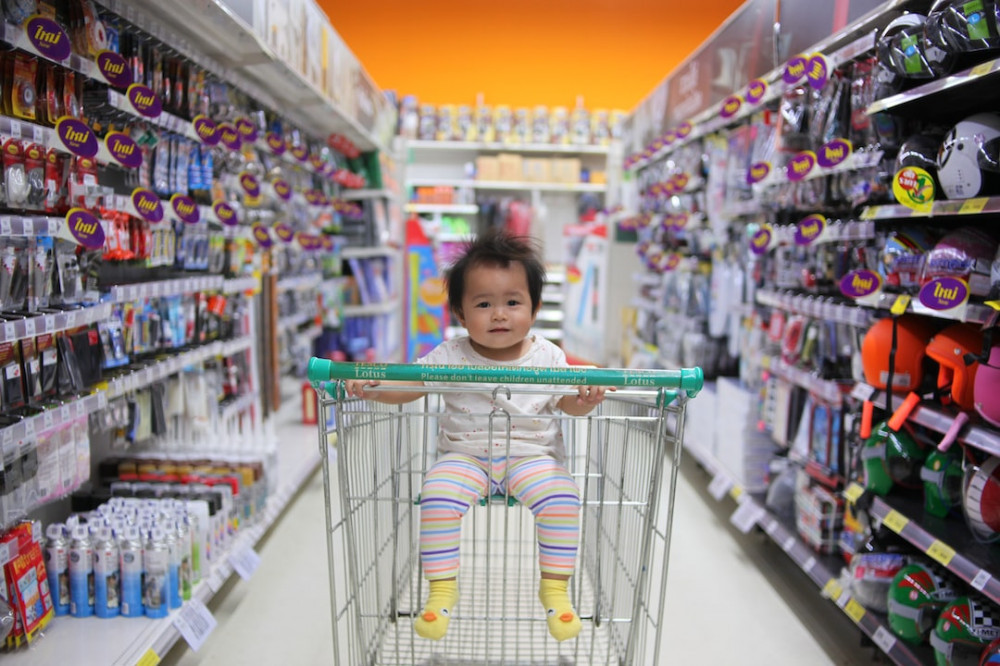
Explain the Cause and Effect Phenomenon ~ flip the wall switch up and the room becomes bright, flip the wall switch
down, and the room becomes dark; pour water to wash, use towel to dry; turn the faucet open, water come flowing out;
turn the faucet close, water stops flowing. And so on. Understanding the cause and effect, an expanded awareness of his/
her surroundings and sensitivity to other people and their needs and feelings, is a far more important step toward
your baby’s eventual mastery of language and reading.
Talk like a grown-up
The use of simplified grown-up talk, instead of baby talk, will help your baby learn to speak correctly. “Charlie wants a
bottle?” instead of “Baby wanna baba?”
Give simple commands
babies can only follow simple instructions at this age, so give simple commands one step at a time. Rather than
saying, ” Please pick up the ball and give it to me”, you can say, “Please pick up the ball”, and then when that has been
accomplished, you can now say, “Now, give the ball to mommy”.
You can also help your baby enjoy early success in following directions that he or she is about to carry anyway. Like for
example, your baby is reaching for a toy, you would say, “Pick up the toy”. This technique will help your baby develop
comprehension, which precedes language.
Keep reading to your child
With babies entering their toddler years, books with pictures of animals, vehicles, toys, and children are still the
favorites. Although their attention span are still relatively short, involve them in the reading, like asking them to point as you
name it, like “Where’s the dog?” The babies would tolerate reading if they are part of the activity.
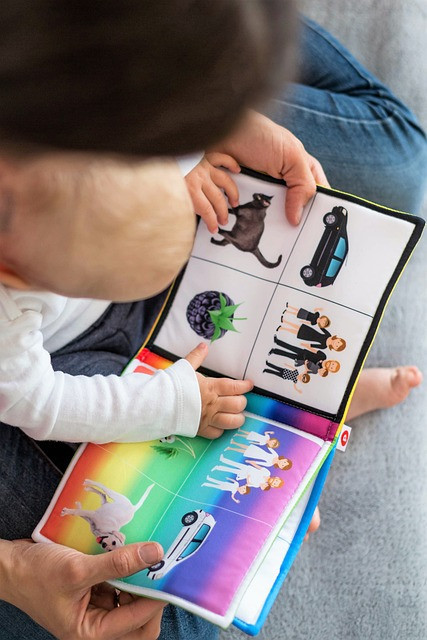
Social and Emotional
He/she feels very secure with parents but anxious with unfamiliar people. Likes to do things that gain parent’s approval. Will
still do parallel play with children, but does not interact with them. Swings from positive to negative moods very quickly.
Easily gets frustrated, and loses temper quite easily.
I want you to feel that you can reach out to me if ever you have questions or want to share ideas that you may have related to the care of babies, growing premature babies, and the overall health issues pertaining to the care of babies OR just drop me a comment to just say “Hello” or “what’s up”
All The Best, Maria Teresa. BabiesBuddies.com

